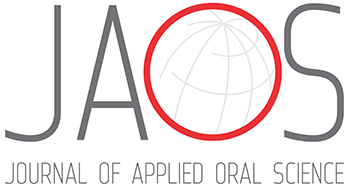Abstract
Aim:
To compare the apical negative pressure irrigation (ANP) with conventional irrigation in the teeth of immature dogs with apical periodontitis.
Methods:
Fifty-two immature pre-molar root canals were randomly assigned into 4 groups: ANP (n=15); conventional irrigation (n=17); healthy teeth (control) (n = 10); and teeth with untreated apical periodontitis (control) (n=10). After induction of apical periodontitis, teeth were instrumented using EndoVac® (apical negative pressure irrigation) or conventional irrigation. The animals were euthanized after 90 days. The sections were stained by HE and analyzed under conventional and fluorescence microscopy. TRAP histoenzymology was also performed. Statistical analyses were performed with the significance level set at 5%.
Results:
There was difference in the histopathological parameters between ANP and conventional groups (p<0.05). The ANP group showed a predominance of low magnitude inflammatory infiltrate, a smaller periodontal ligament, and lower mineralized tissue resorption. There were no differences in the periapical lesion extensions between the ANP and conventional groups (p>0.05). However, a lower number of osteoclasts was observed in the ANP group (p<0.05).
Conclusion:
The EndoVac® irrigation system presented better biological results and more advanced repair process in immature teeth with apical periodontitis than the conventional irrigation system, confirming the hypothesis.
Keywords:
Apical negative pressure irrigation; Apical periodontitis; Apical positive pressure irrigation; Immature teeth





